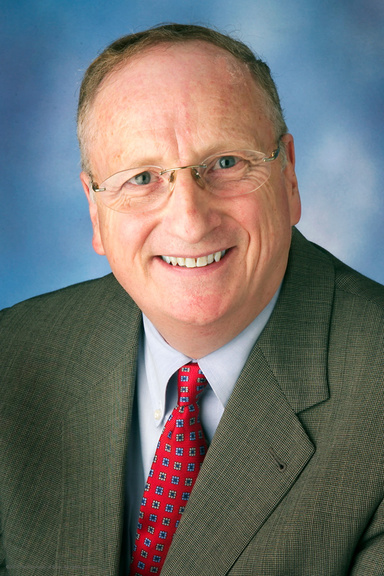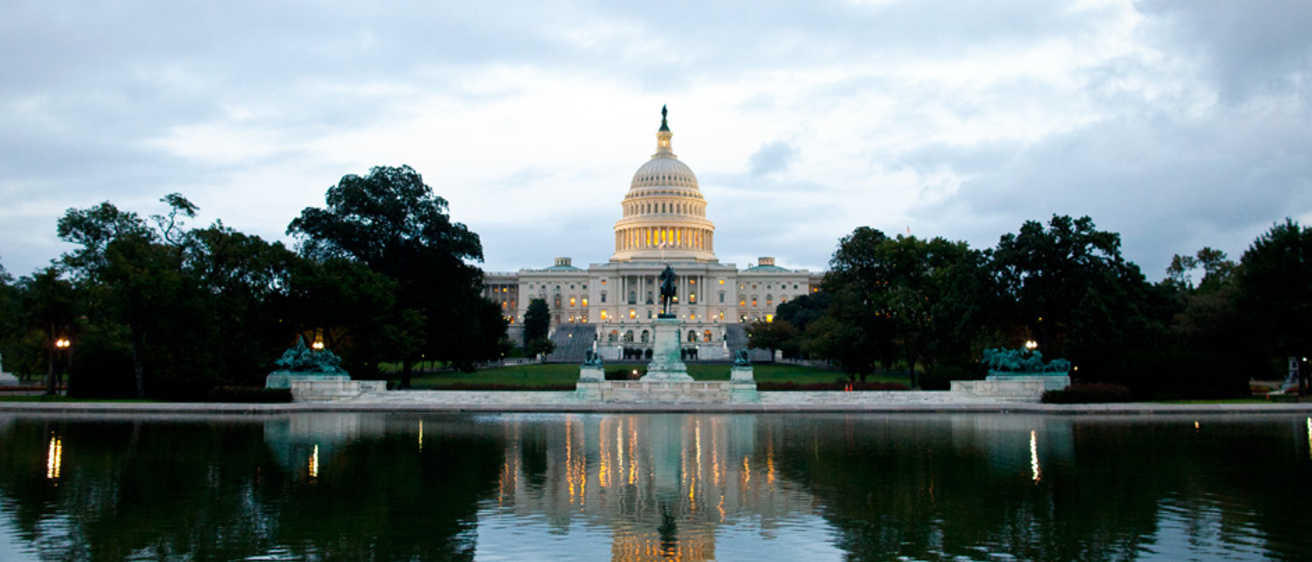For some folks, lobbying is a dirty word. For universities, it’s a way to keep students in the classroom, researchers in the lab, and artists in the studio.
For Derek Willard, it was a fascinating and somewhat unexpected career.

Originally from Concord, Mass., Willard set his sights on academe while in college at the University of Rhode Island, where he received his Bachelor of Arts. He earned a master’s degree at the University of Pennsylvania and taught English at the U.S. Air Force Academy before coming to the University of Iowa for a doctorate.
In the 1980s, he joined the UI Office of the Vice President for Research, which at the time oversaw relations with federal agencies and policymakers. He’d go on to serve as director of federal relations and a special assistant to the UI president.
Willard retired from his governmental relations post July 1. Peter Matthes, who's worked alongside Willard for the last couple of years, has stepped in as the university's new director of federal relations.
Willard talked to Iowa Now about his experience in Washington, the challenges and changes he’s witnessed, and what it means to lobby for a major research university.
Have you always been interested in politics and public policy?
Coming from just north of Boston, you can’t escape politics. Political debate is on your table at breakfast, then again at dinner.
My first job was delivering newspapers, tabloids full of reports on the latest scandals and papers like The New York Times that struck a different tone, but reported issues that were just as contentious. I also grew up around town meetings where anyone could show up and share an opinion on any issue.
Early on, I absorbed the belief that a person shouldn’t just sit on the sidelines as a witness to political life.
Higher education was another early interest for you, right?
From the very first hour of my first college class, I knew I wanted to teach and do research. The importance and urgency of those missions has only grown for me—they brought me here and have animated everything since.
I came to Iowa for the doctoral program in mass communication, among the best of its kind. After completing my Ph.D., I accepted a faculty appointment at the UI College of Dentistry, directing behavioral sciences for the Department of Preventive and Community Dentistry. Over the years, I also served as faculty for the Literature, Science, and the Arts program.
At some point, your work took a different turn, no?
It did. I was appointed an associate vice president for research, working to develop large multidisciplinary initiatives. The work also involved administration of units supporting the university's research mission and compliance with federal law and regulation. Federal governmental relations was a part of this focus.
Federal relations generally means working with the federal agencies of the executive branch and the Congress that deal with appropriated funds and regulatory issues. The focus—trying to influence law and regulation to advance the university's mission—is constant, but the context is always changing.
What are some of the issues you’d deal with most regularly?
Research and student aid are absolutely the bread-and-butter federal issues for higher education lobbyists. You can’t minimize their importance or assume that someone else is addressing them.
At our university, we have over 20,000 students (of the more than 30,500 students enrolled) studying with over $200 million in federal grants and loans. It's crucial that this support is sustained. Any changes to those programs mean big changes for individual students and their families.
Last year, over $300 million in research was conducted on our campus. You simply need to visit UI Hospitals and Clinics to understand the value of research funding—the patients you see are waiting for treatments that may change their lives, and those advances won’t come without a lot of people willing to engage Congress and the executive branch on those issues.
UI President Sally Mason invites the campus community to join a reception honoring Derek Willard today, Friday, July 20.
The event runs 4:30-6 p.m. in the fourth-floor assembly halls at the Levitt Center for University Advancement. Brief remarks at 5:15 p.m.
What’s a typical day like for a higher education lobbyist?
There is no typical day—that’s what’s most interesting about the job. People in our work tend to start each day by reviewing the news electronically to see what happened overnight. Frequently, early-morning breaking news stories occupy the mood and attention of Washington during the day ahead. This sets the tone and the larger context.
The most dramatic case of this was Sept. 11, 2001. I was in Washington that day, and it’s a shining example of how the agenda can shift abruptly and irreversibly.
How did your work change in the days after 9/11?
Here again, the change was mostly context—we still had students who needed to go to school and investigators who needed to conduct research. But our universities could not ignore public concerns with national security.
In general, this involved pointing out that an educated public is best equipped to respond to global challenges. The context also informed specific policy questions, like immigration, for example, where we were able to argue that a global perspective enhances national security.
In a case like that, how do you work with your peers from other schools?
It’s not widely known, but one of the basic jobs of a higher education lobbyist is to lobby other lobbyists. That happens in part through organizations like the Association of American Universities, which unites our top research institutions and has enormous influence over what happens in government.
We connect with our peers, such as other Big Ten schools, on a daily basis to exchange information and collaborate. We work in concert to show that any particular issue is a shared cause that affects tens of thousands of students, or billions of dollars.
Are there specific issues that have been especially close to your heart?
Naturally, I’ve been very strongly committed to student aid and research, but one specific area that stands out is support for the humanities through the National Endowment for the Humanities.
Given Iowa’s history of support for creative work and letters, it was urgent that our university stand up for these causes. Personally, I believe arts and humanities are not ornamental, but are vital parts of the human experience.
Working in Washington, do you need to re-learn your job every time there’s an election?
You definitely need to refocus with every shift, but what happens during a given Congress or a given administration is just as important. You can’t take for granted that the personalities, interests, and issues at stake will remain constant.
The person who seems to be so contentious one day may have a completely different view the next time you meet. Same goes for the person who’s been a supportive ally.
Do you feel there’s been a shift in the tenor of Washington during your time?
I think it’s far more polarized than when I first started the job, without question. In large measure, I think that’s due to districting.
Iowa has a very reasonable, rational, and transparent way of creating Congressional districts, but not every state is like us. Many have districted according to parties and leaders, putting like perspectives with like perspectives, and providing no reward for compromise or consensus.
What’s next for you in retirement?
As a social scientist, I have a lifelong interest in the relationship between individuals and the institutions they create, so I plan to use my emeritus faculty status to continue research in this area. My wife and I also have extensive plans to visit our seven grandchildren in their various locations.
